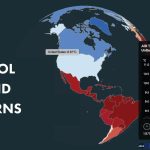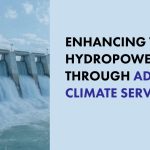Advancing climate services for a sustainable future: WEMC’s role in tackling the energy transition
You may not be familiar with ‘climate services’ but will certainly know about climate change.
WEMC are climate data specialists, we collect, analyse, and interpret data around our global climate, and then look for data-driven solutions to help inform decision-making aimed at tackling pressing climate issues for use by a variety of stakeholders.
We focus our expertise on advancing and developing climate services for sustainable and efficient energy systems, while also collaborating with other sectors. By providing organisations with user-specific climate services we can assist with the adaption of practices and mitigation against future climate variability impacts for the benefit of society.
Our efforts are aligned with helping organisations respond to measures outlined in the 2015 Paris Agreement, to mobilise collective action to address “the increase in the global average temperature to well below 2°C above pre-industrial levels” and pursue efforts “to limit the temperature increase to 1.5°C above pre-industrial levels”.
WEMC focus on energy sector climate challenges
Substantial individual and collaborative actions are needed to curb rising global greenhouse gas emissions and, consequently, temperatures.
WEMC Managing Director, Alberto Troccoli, is an authoritative voice on the shared climate challenges we are facing, and, as the main driver of climate change, how action is needed in the energy sector.
A regularly invited speaker at energy-focused climate forums, Alberto recently chaired a workshop in the United Arab Emirates (UAE) with global experts, gathered to discuss topics related to energy and meteorology. Organised and hosted by the National Center of Meteorology of the UAE, with the support of the World Meteorological Organization and the International Renewable Energy Agency, the workshop aimed to facilitate change by providing specialist weather and climate services to the renewable energy sector. This would be achieved by forging a global partnership to support clean energy transition.
Currently, there is a gap in the support needed to empower countries to reach net zero emission targets between 2050 and 2100, one of the commitments listed in the Paris Agreement and the UAE Consensus. By providing climate data, information and knowledge, climate services can bridge the gap between climate science and climate-sensitive sector expertise, and ultimately assist in the decision-making process.
WEMC partnering with organisations to bridge the knowledge gap
By partnering with organisations with user-focused climate services, WEMC aims to support the global energy transition with the transfer of knowledge to enable localised decision-making.
We are currently contributing to the EU FOCUS-AFRICA project by developing climate services for the energy and agricultural sectors while trying to maximise socio-economic benefits for the Southern African Development Community. For the EU FOCI project, WEMC is investigating the role of energy, and other sectors, in non-CO2 gas emissions. The aim is to better understand the impacts of key non-CO2 climate forcing pollutants assessing where and how they arise, and their role in climate impacts on energy systems. A more recent partnering is the EU CROSSEU project, equipping stakeholders with tools and insights to help decision-making for climate challenges across Europe and the UK.
A key WEMC-developed tool supporting all our collaborations is the climate data visualisation Teal tool. One feature of Teal is the visualisation of heat-trapping carbon dioxide emissions data by country and region, and with the central commitment of countries to the Paris Agreement to cut emissions, known as Nationally Determined Contributions, the tool can aid individual action and efforts.
WEMC active contributor to global climate and energy discussions
In summary, WEMC plays a leading role in merging climate science with sector-specific expertise to drive informed decision-making on climate change. Focused on advancing climate services for energy systems, WEMC’s work aligns with the 2015 Paris Agreement’s goals, aiming to mitigate climate impacts and support global efforts to limit temperature increases.
Under the guidance of Managing Director Alberto Troccoli, WEMC actively contributes to global climate and energy discussions, such as the UAE workshop for renewable energy. Through strategic partnerships like the EU FOCUS-AFRICA and EU CROSSEU projects, WEMC bridges the gap between climate science and practical application, empowering stakeholders to make informed decisions and supporting the global transition to sustainable energy systems.
Stay connected with us on social media, and don’t forget to subscribe to our newsletter delivered to your inbox typically twice a year.




